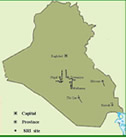IRAQ
Overview
After learning of SRI at an international forum on hybrid rice in China in 2004, Dr. Khidir Abbas Hameed, a rice scientist from the Al-Mishkhab Rice Research Station (MRRS) near Najaf, was the first to try out SRI methods in Iraq. In 2005, on ¼ hectare with the "parachute method," he tried early transplanting (12-day-old seedlings) and wide spacing (25x25 cm), using just 30 kg of seeds per hectare. With the popular variety Amber 33, SRI yields were 18% higher than with the usual dry method and resulted in 81% seed saving plus unmeasured water saving. Trials carried out in three provinces (Basrah, Messan and Thi-Qar) were impressive enough that the Minister of Agriculture, when visiting them, promised to support extension of the new methods.
Labor: Because labor scarcity has made transplanting rice difficult in Iraq during the first decade of the century, a "parachute planting" method was devised, which involves throwing young seedlings onto a shallow-puddled field, where they establish themselves without being pushed into the soil. During subsequent years, a paddy mechanization project carried out cooperatively by MRRS with the State Board of Agriculture Extension and Cooperation (SBAEC) and the State Bureau of Agricultural Research (SBAR) has shown greater promise for dealing with labor constraints (see video and photos of the mechanized transplanter).
Water: Water saving is of much interest in the Iraqi context. Trials in 2006 showed yield increases of 20-26% with a reduction in water requirements. A field study on water use efficiency (IWUE) conducted in 2009 at MRRS evaluated irrigation with traditional methods compared to SRI recommendations. SRI methods resulted in more vigorous growth of roots, a 42% increase in grain yield, and WUE of 0.291 kg/m2 compared with 0.108 kg/m2 for conventional rice crop and water management, almost a three-fold difference. SRI reduced the need for irrigation water by about 38.5%. A 2023 study showed that the highest water productivity was achieved with 7-day intervals of irrigation together with SRI methods. While this entails a 13% yield reduction compared to continuous submergence of the crop, the water-saving was 72%, allowing scarce water could be used for additional rice fields or other valuable uses.
Organic matter: According to a report, SRI has led MRRS researchers to pay more attention to use of organic matter, instead of relying entirely on chemical fertilizer, with promising results. In 2009 trials, the SRI treatment using 5 tons/ha of OM combined with half the usual amount of chemical fertilizer gave the highest average grain yield (7,360 ton/ha), 22% more than the lowest treatment (6,036 ton/ha), which was achieved with farmers’ current transplanting methods. In order to increase the availability of organic matter, more than 100 farmers in three provinces (Najaf, Diwaniya, and Al-Muthanna) have cultivated a clover crop after their rice crop to restore the fertility of their rice-growing lands, although the areas used are still small since the government has not received or provided sufficient clover seeds.
SRI Promotion: The MRSS has been very active in promoting SRI since 2005. Its staff have produced three videos, it has been featured on Iraqi TV and in newspapers, and it has promoted SRI at the 6th AEA Agriculture Fair. Khidir Hameed, together with MRRS director Flayeh Abed Jaber and colleagues, have given numerous presentations, training sessions and workshops to agricultural
staff and farmers in 8 provinces (Baghdad, Messan, Babel, Thi Qar, Basrah, Najaf, Diwaniya and Al-Muthanna), although most of the SRI demonstrations and trials have been in the first three provinces noted. (See details of 2009 Najaf/Diwaniya training, a series of 2008 Muthanna lectures/demonstrations reaching 2,000 farmers, a 2008 research station field day with 400 attendees, and a 2007 Diwaniya training course.)
During 2007, a national SRI committee was established with several staff of Al-Mishkhab Rice Research Station (MRRS) near Najaf, including its Director and a representative from the General Company for Horticulture and Forestry, which has experience with the production and management of organic matter. The committee intended to promote extension of SRI methods in Iraq and to formulate a national SRI project.
The expansion of SRI work in Iraq during 2008 was assisted by a Japanese donor who learned about the initiatives of Dr. Khidhir and colleagues through this SRI website. Summer season experiments with Jasmine rice in Al-Muthanna Province in southern Iraq confirmed that SRI practices can, despite greatly reduced plant populations, improve both plant performance and yields under Iraqi conditions (7,040 kg/ha compared with 4,668 kg/ha for non-SRI methods) while reducing water use, saving seed (as much as 80%), and lowering costs of production. SRI - System of Rice Intensification in Iraq. A video produced by MRRS in 2009 documents SRI success and constraints in Iraq based on 2008 experiences promoting SRI in Al-Muthanna Province. For implementation of SRI over large farm areas, the authors (Hameed et al.) recommend use of a transplanting machine, which is being tested at the Al-Mishkhab Rice Research Station, Najaf.
Dr. Abdul Hussein El-Hakim completed an assessment of the economic costs and returns for the 16 farmers in four districts of Al-Muthanna province who used both SRI and conventional methods on their farms in 2008, as well as for 16 nearby farmers who grew rice with their usual methods. The farmer evaluations of SRI were uniformly positive, citing 25-30% less irrigation water required, 50% reduction in fertilizer and 75-80% reduction in seed requirements; this was accompanied by a 100% reduction in agrochemical crop protection. Average yields were 75% higher with SRI methods. These benefits are starting to attract support from the Ministry of Agriculture and donor agencies, according to Dr. Khidhir, who was given an award in recognition of his work on SRI and water management by the Prime Minister during the country's Second Agricultural Week held at the Baghdad International Fairgrounds, April 14-21, 2010.
With support from the Iraq Ministry of Agriculture, the State Bureau of Agricultural Research (SBAR) and Al-Mishkhab Rice Research Station (MRRS) continued their SRI activities in 2010, primarily working in Najaf and Diwaniya Provinces with cooperation from the State Board of Agriculture Extension and Cooperation (SBAEC) and the Directorates of Agriculture (DAs) in those provinces. During 2011, an article documenting positive SRI results for irrigation was published in the Journal of Paddy and Water Environment. Later that year, a workshop at the Ministry of Agriculture revealed growing interest in extending SRI to to other provinces, with most supporting the use of transplanting machines in their areas due to labor considerations. The Minister of Agriculture also agreed to establish an SRI ministerial committee for planning and managing the SRI system in Iraq. Khidhir Hameed from the Agricultural Research Office Al-Mishkhab Rice Research station summed up the past nine years of SRI progress in Iraq in his presentation on Iraq's Strategy for Innovative Rice Irrigation and Water Management in Iraq at the Drought Risk Management, Desertification and Dust Storms Workshop held March 2-6, 2014, in Amman, Jordan. In 2016, Laith Naeem Hassouni from the College of Agriculture in Baghdad University completed his master's thesis on the effects of irrigation scheduling and the application of organic matter on rice yield under SRI. The thesis showed great benefits from water reduction
contributing to a yield increase of 29.5%.
During October 2018, Khidhir Abbas Hameed represented Iraq at two SRI events in Southeast Asia: 1) Workshop to Enhance Cooperation and Sharing among SRI National Networks in Asia and 2) the SRI research side event at the 5th International Rice Congress (IRC) in Singapore. (His presentations at the events are listed below). He also presented a poster at the 2nd Symposium on Agroecology in Rome that year. During 2019, Abbas Hameed carried out additional SRI trials in three provinces that compared with conventional farming method (CFM); SRI methods gave higher grain yield with both varieties in each province (25.6% in at Muthanna province, 24.5% in Najaf province, and 13.2% in Diwaniya province), while saving water and reducing inputs. Looking into the potential of SRI as an environment-friendly, input-saving and yield-enhancing strategy, the Ministry of Agriculture of Iraq has included SRI methodology as one of the components of its National High Yielding Rice Seeds Production Program.
During October 2023,Iraq was represented at the 6th International Rice Congress in Manila Philippines, by Khidhir Abbas Hameed, who presented a poster co-authored by Abdulkadhim Jawad Musa entitied Positive opportunities for SRI system in Iraq under the current conditions of climate change. On May 29, 2024, the General Directorate of Agriculture in Erbil held a scientific symposium entitled “System of Rice Intensification and its role in mitigating the impact of climate change” in the Harir district of northern Iraq's Kurdistan Region. A second symposium in Kurdistan was held August 6, 2024, in the Salymania Governate. A 2024 article by Amenah Kery reports on on the financial viability of implementing SRI in Iraq; the The study, which focused on reducing water usage and costs while increasing revenues, indicated that a significant percentage of farmers are expected to adopt SRI over time, despite the initial hesitation to change traditional farming methods.
Progress and Activities
2025 Updates
 Financial Evaluation of SRI Methods and Forecasting of Farmers' Adoption Show Positive Results
Financial Evaluation of SRI Methods and Forecasting of Farmers' Adoption Show Positive Results
[July 9, 2025] A 2024 article by Amenah Kery published in the Journal of Accounting and Financial Studies reports on investigations into the financial viability of implementing System of Rice Intensification (SRI) in Iraq; the focus of the work is on reducing water usage and costs while increasing revenues. The study analyzed two rice varieties, Amber 33 and Jasmine, using financial evaluation criteria such as Net Present Value (NPV), Investment Profitability (IP), and Internal Rate of Return (IRR). Results indicated that both varieties demonstrated economic feasibility, with the Jasmine variety showing particularly strong investment potential. Furthermore, the ADOPT analysis demonstrated that a significant percentage of farmers are expected to adopt SRI over time, despite the initial hesitation to change traditional farming methods. For more information see full article.
2024
 SRI Symposium Takes Place in Salymania Governorate in Northern Iraq's Kurdistan Region
SRI Symposium Takes Place in Salymania Governorate in Northern Iraq's Kurdistan Region
[August 7, 2024] Coordinated by the agricultural researcher Zana M. Dabagh from the
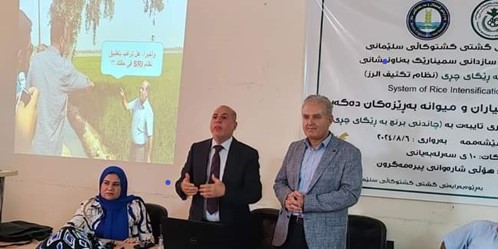 Directorate of Agricultural Research in Salymania Governorate, the Directorate of Agricultural Research organized a scientific symposium on the System of Rice Intensification (SRI) on August 6, 2024, in the Birah Magrun sub-district of Dokan district (30 km west of Salymania Governorate).
Khidhir Abbas Hameed presented a seminar entitled “Positive Opportunities of the System of Rice Intensification (SRI) under Current Conditions of Climate Change,” which included justifications for implementing SRI in the Kurdistan Region; overview of SRI principles/practices; and the positive results achieved from application of SRI methods in the Al-Mishkhab Rice Research Station (MRRS) plots and on farmers' fields in central and southern Iraq.
Directorate of Agricultural Research in Salymania Governorate, the Directorate of Agricultural Research organized a scientific symposium on the System of Rice Intensification (SRI) on August 6, 2024, in the Birah Magrun sub-district of Dokan district (30 km west of Salymania Governorate).
Khidhir Abbas Hameed presented a seminar entitled “Positive Opportunities of the System of Rice Intensification (SRI) under Current Conditions of Climate Change,” which included justifications for implementing SRI in the Kurdistan Region; overview of SRI principles/practices; and the positive results achieved from application of SRI methods in the Al-Mishkhab Rice Research Station (MRRS) plots and on farmers' fields in central and southern Iraq. More than 75 rice farmers, technical staff, and other officials attended this symposium; ten farmers expressed a desire to try out SRI methods. An SRI bulletin will be translated from Arabic into Kurdish language and distributed within the year. [For more information, see Khidhir Abbas Hameed's report and a post from the General Directorate of Agriculture in Salymania's Facebook page, which contains videos in Arabic.]
 System of Rice Intensification (SRI) Symposium Held in Erbil in Kurdistan Region
System of Rice Intensification (SRI) Symposium Held in Erbil in Kurdistan Region
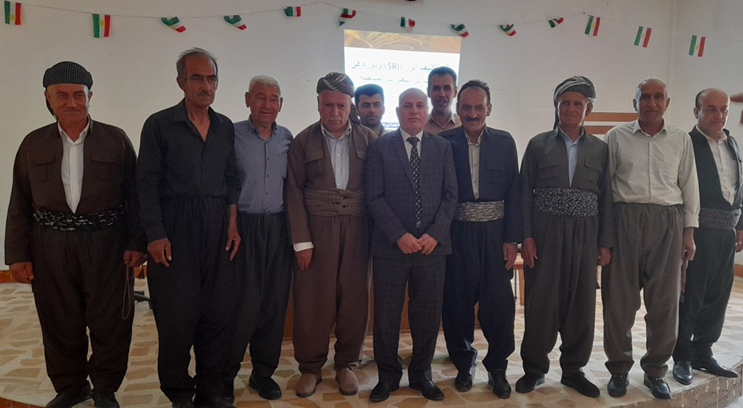 [May 31, 2024] On May 29, 2024, the General Directorate of Agriculture in Erbil held a scientific symposium entitled “System of Rice Intensification and its role in mitigating the impact of climate change” in the Harir district of northern Iraq's Kurdistan Region. The symposium was attended by more than 50 people that included both the directorate's technical staff and rice farmers. Khidhir A. Hameed presented a lecture showing how SRI methods could improve the farmers' economic conditions, quality of grain, and soil conditions, while at the same time. reducing methane emissions that contribute to climate change.
[May 31, 2024] On May 29, 2024, the General Directorate of Agriculture in Erbil held a scientific symposium entitled “System of Rice Intensification and its role in mitigating the impact of climate change” in the Harir district of northern Iraq's Kurdistan Region. The symposium was attended by more than 50 people that included both the directorate's technical staff and rice farmers. Khidhir A. Hameed presented a lecture showing how SRI methods could improve the farmers' economic conditions, quality of grain, and soil conditions, while at the same time. reducing methane emissions that contribute to climate change. Following the event, the principles of the SRI system will be applied in demonstration fields to encourage farmers implement SRI methods in the future. Dr. Hameed also proposed to the Director General of Agriculture in Erbil to hold a training course for the research staff and key farmers in order to expedite the adoption of SRI methods in the Kurdistan region and also to carry out research and studies intended to support the wider adoption of SRI in the region.
2023
 Iraq Represented at 6th International Rice Congress and Other Events in the Philippines
Iraq Represented at 6th International Rice Congress and Other Events in the Philippines
[October 31, 2023] A delegation from the global SRI community attended the 6th International Rice Congress (IRC) in Manila, Philippines, held October 16-19, 2023. The group included SRI representatives from Chile, India, Indonesia, Iraq, Malaysia, Myanmar, Nigeria, the Philippines, UK, and USA. Iraq was represented by Khidhir Abbas Hameed, who presented a poster co-authored by Abdulkadhim Jawad Musa entitied Positive opportunities for SRI system in Iraq under the current conditions of climate change. Dr. Hameed also answered queries at the SRI booth at the IRC, and subsequently participated in side events, including a SRI Research Network meeting, a SRI meeting for national/regional SRI networks around the world, and field trips to Quezon and La Union provinces. In addition to the IRC events, He also gave a presentations at a Philippines Department of Agriculture Forum on SRI on October 20, 2023.
 Research Shows Economic and Water Savings with SRI in Iraq
Research Shows Economic and Water Savings with SRI in Iraq
[June 15, 2023] An article by Khidhir Abbas Hameed published in the journal Agronomy describes a field study showing water savings and economic benefits of using the System of Rice Intensification (SRI) in Iraq. The findings show that the highest water productivity was achieved with 7-day intervals of irrigation together with SRI methods. However, this entails some sacrifice of the yield as 13% less grain is produced than with continuous submergence of the crop. With 7-day intervals compared to 3-day intervals, water-saving was 44%, but compared to continuous submergence of the crop, the saving was 72%. This large amount of water could, if redeployed, enable many more farmers to cultivate larger areas of the land, increasing total rice production for Iraq; some of the water saved could be put to other, high-value uses. It would thus benefit the country and many farmers if, in return for rice farmers’ using irrigation water more productively, those who currently grow rice could be persuaded to accept a grain yield somewhat lower than they could produce with 3-day intervals of irrigation and SRI crop management. [See full article for details.]
2022
 Iraq Represented at System of Crop Intensification Event in Hyderabad, India
Iraq Represented at System of Crop Intensification Event in Hyderabad, India
[December 15, 2022] Khidhir Abbas Hameed participated in the International Conference on System of Crop Intensification for Climate-Smart Livelihood and Nutritional Security, whih was held at ICAR - Indian Institute of Rice Research (IIRR) in Hyderabad, Telangana, India, on December 12-14, 2022. As lead speaker, he delivered a presentation on successes of the System of Rice Intensification (SRI) in Iraq and its contribution to saving water and economic benefits. The talk was entitled " Estimated water savings, yield, and income benefits from SRI methods in southern Iraq. [See article and PowerPoint presentation]
2021
 SRI Trials in Azerbaijan, Turkey and Iraq Sponsored by CWA
SRI Trials in Azerbaijan, Turkey and Iraq Sponsored by CWA
[December 1, 2021] At the Central and West Asia Rice Center (CWA-Rice) annual meeting, Khidhir Abbas Hameed suggested including System of Rice Intensification (SRI) in the scientific activities of all Center country-members due to the positive results seen in Iraq and abroad. Due to COVID-19, the activities started with a virtual training course on Sustainable Rice Production, which began with SRI. The training was intended for rice researchers in all CWA-Rice member countries.
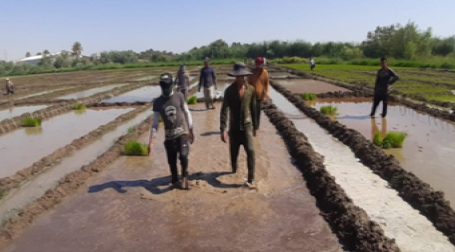 At the start of the 2021 rice season, the head of CWA-Rice Center decided to implement the SRI system with a unified experiment in three member-countries: Iraq, Turkey, and Azerbaijan. Three kinds of organic manure (cow, poultry, and sheep) were compared with no-fertilizer trials, using three rice varieties to determine which variety gives the highest yield combined together with which kind of organic manure (according to the soils of these countries). Based on results, the Center will make recommendations to implement the new methods in farmers' fields. The cultivation is done with SRI principles: One seedling per hill, wide spacing between seedlings, early transplanting, using alternate wetting and drying (AWD) irrigation, and removing weeds by hand or mechanically. [See report for details.]
At the start of the 2021 rice season, the head of CWA-Rice Center decided to implement the SRI system with a unified experiment in three member-countries: Iraq, Turkey, and Azerbaijan. Three kinds of organic manure (cow, poultry, and sheep) were compared with no-fertilizer trials, using three rice varieties to determine which variety gives the highest yield combined together with which kind of organic manure (according to the soils of these countries). Based on results, the Center will make recommendations to implement the new methods in farmers' fields. The cultivation is done with SRI principles: One seedling per hill, wide spacing between seedlings, early transplanting, using alternate wetting and drying (AWD) irrigation, and removing weeds by hand or mechanically. [See report for details.] Ministry of Agriculture Supports 4-Season SRI Trials and Recognizes SRI Rice Farmers
Ministry of Agriculture Supports 4-Season SRI Trials and Recognizes SRI Rice Farmers
[November 30, 2021] During four rice seasons (2018-2021), the Ministry of Agriculture included SRI system in its annual scientific program at the Al-Mishkhab Rice Research Station. The ministry also recognized Distinguished Rice Farmers who practice SRI rice-growing in Iraqi provinces, producing high-grade rice seed with nearly 100%
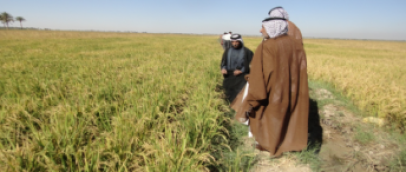 purity. Use of SRI principles, including planting fewer seedlings and transplanting seedlings in rows, contributed to easier weeding and removal of off-type plants by hand, which in turn contributed to production of high-purity rice seeds. Due to the addition of natural fertilizer, rice plants had less need for water, and this contributed to more filled grains at maturity stage.
[See report for details.]
purity. Use of SRI principles, including planting fewer seedlings and transplanting seedlings in rows, contributed to easier weeding and removal of off-type plants by hand, which in turn contributed to production of high-purity rice seeds. Due to the addition of natural fertilizer, rice plants had less need for water, and this contributed to more filled grains at maturity stage.
[See report for details.] Variety and Methodology Study in Three Provinces Shows Best Results Using SRI and Jasmine Rice
Variety and Methodology Study in Three Provinces Shows Best Results Using SRI and Jasmine Rice
[November 26, 2021] The results of a comparison study of two rice varieties and two production methods was presented the Fourth International Conference for Agricultural and Sustainability Sciences, held October 4-5, 2021, in Babil, Iraq. The effects of SRI method on grain yield and its components in two rice varieties (Anber33 and Jasmine) were compared with conventional practice in farmers' fields (CFM) in different environmental conditions in Iraq. The study was conducted in the fields during 2019 in three provinces in the south of Iraq (Najaf, Diwaniya and Muthanna). The two varieties were grown in each location and the traits were conducted at sites having 2 donum of land (5,000 m2). The results showed the SRI method was superior to the CFM method in rice traits (plant height and panicle length, number per panicle, and percentage of unfilled grains). Furthermore, SRI method gave higher grain yield as a percentage with both varieties in each province (25.6% in Muthanna, 24.5% in Najaf, and 13.2% in Diwaniya province) compared to CFM. However, grain yield in Jasmine variety was higher than Anber33 by approximately 50% in three locations in this study. Overall, the authors believe that SRI method should be recommended in Iraq due to the increased grain yield in rice compared to the CFM method. [See full article in the IOP Science Series.]
2020
 SRI Presentation Included in Central & West Asian Rice Center Webinar
SRI Presentation Included in Central & West Asian Rice Center Webinar
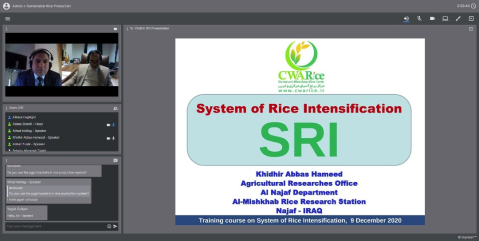 [December 9, 2020]
Dr. Khidhir Abbas Hameed, Senior Scientist at the Almishkab Rice Research Institute in Najaf, Iraq,
gave a presentation on the System of Rice Intensification during the morning session (December 9, 2020) of a two-day webinar on Sustainable Rice Production (SRP). The online event, which was organized by the Central & West Asian Rice Center, covered some of the recent innovations, trends, and concerns, as well as practical challenges and solutions, that have been adopted to encourage more sustainable rice production.
The overall webinar focused on organic rice production.
The participants suggested a follow-up training and discussion to learn more about SRI. [See the presentation and the C&WA Rice Center event page for details.]
[December 9, 2020]
Dr. Khidhir Abbas Hameed, Senior Scientist at the Almishkab Rice Research Institute in Najaf, Iraq,
gave a presentation on the System of Rice Intensification during the morning session (December 9, 2020) of a two-day webinar on Sustainable Rice Production (SRP). The online event, which was organized by the Central & West Asian Rice Center, covered some of the recent innovations, trends, and concerns, as well as practical challenges and solutions, that have been adopted to encourage more sustainable rice production.
The overall webinar focused on organic rice production.
The participants suggested a follow-up training and discussion to learn more about SRI. [See the presentation and the C&WA Rice Center event page for details.]-
 TV Broadcast about Rice Cultivation in Al-Muthanna Province Features SRI
TV Broadcast about Rice Cultivation in Al-Muthanna Province Features SRI
[October 10, 2020] UTV, the national public television channel in Iraq, broadcast a report on October 3, 2020, about rice cultivation innovations in Al-Muthanna province [see Facebook video clip]. The next day it was shown as part of the main agricultural news program of UTV, featuring projects such as mechanical transplanting, cultivation of promising new varieties, and implementation of SRI, led by the Al-Mishkhab Rice Research Station. The program highlighted the experience of one of the pioneer rice farmers in the province, Abdul-Ameer Uweiz, who said: “Initially, I began testing the SRI system in my field with a quarter hectare, but recently I have expanded my use of this system to 10 hectares due to the positive results. We have asked the Ministry of Agriculture to support the application of modernizing programs for the rice crop such as the SRI system.” The Director of Agriculture Directorate in Al-Muthanna province, Mr. Amer Al-Jabiri said: “The total of area for cultivating rice in the province is 6,250 ha, but now we are cultivating only about 2,625 ha because of water supply constraints. If the Ministry of Agriculture and the Ministry of Water Resources will support the agricultural situation in Al-Muthanna province, with these innovations we can reach to 10,000 ha.” At the end of the report, the presenter said: “These modern technologies in rice cultivation can substantially increase rice production for the agricultural market at Al-Muthanna province." [Information provided by Khidhir Abbas Hameed].
 Khidhir Abbas Hameed Presents SRI Research from Three Provinces
Khidhir Abbas Hameed Presents SRI Research from Three Provinces
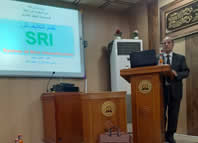 [January 20, 2020] Studies were conducted in farmers' fields during the 2019 rice season in three provinces in southern Iraq (in Najaf at Al Abbasiya district, in Diwaniya at Al Shamiya district, and in Muthanna at Al-Rumatha district) comparing the results of the SRI rice farming methodology vs. farmers’ conventional farming methods in terms of grain yield and components of yield. The results of the study were presented by Khidhir Abbas Hameed (at right) at the Scientific Symposium on Rice and Wheat as an Essential Axis in Achieving Food Security, held at Muthanna University on January 13, 2020. These results will also be presented on April 10, 2020, at the International Conference on Modern Research Achievements, to be held at the University of Vienna in Austria.
[January 20, 2020] Studies were conducted in farmers' fields during the 2019 rice season in three provinces in southern Iraq (in Najaf at Al Abbasiya district, in Diwaniya at Al Shamiya district, and in Muthanna at Al-Rumatha district) comparing the results of the SRI rice farming methodology vs. farmers’ conventional farming methods in terms of grain yield and components of yield. The results of the study were presented by Khidhir Abbas Hameed (at right) at the Scientific Symposium on Rice and Wheat as an Essential Axis in Achieving Food Security, held at Muthanna University on January 13, 2020. These results will also be presented on April 10, 2020, at the International Conference on Modern Research Achievements, to be held at the University of Vienna in Austria.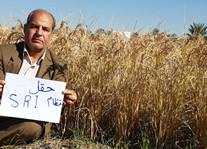 The rice varieties grown were Anbar 33 and Jasmine, both popular local varieties. At each location, the trials were conducted at sites having 2 donum of land (5,000 m-2). With SRI methods, there were favorable and significant impacts on plant height and panicle length, with significant differences in the yield components of grain number per panicle and percentage of unfilled grains. There were no significant differences in 1000-grain weight. Compared with conventional farming method (CFM), SRI methods gave higher grain yield with both varieties in each province (25.6% in at Muthanna province, 24.5% in Najaf province, and 13.2% in Diwaniya province). In all cases, the SRI modern farming method had a favorable effect on grain yield and components of yield as compared to CFM.
This study showed that it is possible to getting higher yield, 25% or more, with better plant performance and resilience when using the modern farming system of SRI system. At the same time it reduces the water requirements for growing rice by 25% or more, which could be a major contribution to agriculture in Iraq by helping counter the severe shortages in water that are facing Iraq now and in the years to come. Looking into the potential of SRI as an environment-friendly, input-saving and yield-enhancing strategy, the Ministry of Agriculture of Iraq has included SRI methodology as one of the components of its National High Yielding Rice Seeds Production Program.
The rice varieties grown were Anbar 33 and Jasmine, both popular local varieties. At each location, the trials were conducted at sites having 2 donum of land (5,000 m-2). With SRI methods, there were favorable and significant impacts on plant height and panicle length, with significant differences in the yield components of grain number per panicle and percentage of unfilled grains. There were no significant differences in 1000-grain weight. Compared with conventional farming method (CFM), SRI methods gave higher grain yield with both varieties in each province (25.6% in at Muthanna province, 24.5% in Najaf province, and 13.2% in Diwaniya province). In all cases, the SRI modern farming method had a favorable effect on grain yield and components of yield as compared to CFM.
This study showed that it is possible to getting higher yield, 25% or more, with better plant performance and resilience when using the modern farming system of SRI system. At the same time it reduces the water requirements for growing rice by 25% or more, which could be a major contribution to agriculture in Iraq by helping counter the severe shortages in water that are facing Iraq now and in the years to come. Looking into the potential of SRI as an environment-friendly, input-saving and yield-enhancing strategy, the Ministry of Agriculture of Iraq has included SRI methodology as one of the components of its National High Yielding Rice Seeds Production Program.
2018
 Khidhir Abbas Hameed Represents the Iraq at Two SRI Events in Southeast Asia
Khidhir Abbas Hameed Represents the Iraq at Two SRI Events in Southeast Asia
 [October 20, 2018] Khidhir Abbas Hameed made a presentation on Initiatives to Spread the SRI in the Middle East and Central Asia at the Workshop to Enhance Cooperation and Sharing among SRI National Networks in Asia, held October 18-19, 2018, in Johor Bahru, Malaysia. The event, which was attended by 54 participants from 17 countries, was organized by the Malaysian Agroecology Society (SRI-Mas), the Asian Centre of Innovation for
[October 20, 2018] Khidhir Abbas Hameed made a presentation on Initiatives to Spread the SRI in the Middle East and Central Asia at the Workshop to Enhance Cooperation and Sharing among SRI National Networks in Asia, held October 18-19, 2018, in Johor Bahru, Malaysia. The event, which was attended by 54 participants from 17 countries, was organized by the Malaysian Agroecology Society (SRI-Mas), the Asian Centre of Innovation for 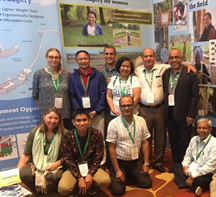 ACISAI Centre at the Asian Institute of Technology, and SRI-Rice at Cornell University. It allowed SRI network representatives and other stakeholders to share experiences and to investigate opportunities to collaborate on scaling-up, multi-country research, value chain improvements, accessing resources, and capacity building for SRI networks. The workshop also mapped out the possibilities for forming an Asia Regional SRI Network from the ten Asian SRI networks that operating the region. Hameed's presentation considered how the SRI Community in Iraq, as well as those working with SRI the rest of the Middle East and Central Asia, could interact with national and regional SRI networks in Asia, Africa and Latin America. [Workshop presentations by other participants are also available.]
ACISAI Centre at the Asian Institute of Technology, and SRI-Rice at Cornell University. It allowed SRI network representatives and other stakeholders to share experiences and to investigate opportunities to collaborate on scaling-up, multi-country research, value chain improvements, accessing resources, and capacity building for SRI networks. The workshop also mapped out the possibilities for forming an Asia Regional SRI Network from the ten Asian SRI networks that operating the region. Hameed's presentation considered how the SRI Community in Iraq, as well as those working with SRI the rest of the Middle East and Central Asia, could interact with national and regional SRI networks in Asia, Africa and Latin America. [Workshop presentations by other participants are also available.]Prior to the participating in the SRI Networks Workshop in Malaysia, Hameed attended the 5th International Rice Congress (IRC) in Singapore, held October 15-17, 2018. During the Congress, he presented a poster during regular sessions as well as a talk on Rice Water Management and Reduction in Iraq at the SRI-Rice research side event (SRI Research: What's New and What's on the Horizon, held October 16; see other side event presentations.)Hameed also helped provide SRI information to the event participants from the SRI-Rice/Oxfam booth during the three-day event. He is shown (standing second from right in the picture at left) together with SRI colleagues
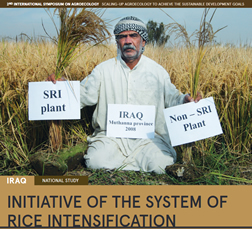 at the SRI booth.
at the SRI booth. Poster on the Adaptation of SRI in Iraq Over 13 Years Presented at FAO International Agroecology Symposium
in Rome
Poster on the Adaptation of SRI in Iraq Over 13 Years Presented at FAO International Agroecology Symposium
in Rome
[April 5, 2018] A poster by Khidhir Abbas Hameed was presented April 3-5, 2018, at the 2nd International Symposium on Agroecology, which was held at the UN Food and Agriculture Organization in Rome. The poster documents SRI trials and experience with SRI over a 13-year period in Iraq. Beginning in 2005, experiments with SRI methods began at Al-Mishkhab Rice Research Station (MRRS) in Najaf. A year later, in 2006, evaluation of SRI was extended into the provinces of Basrah, Messan and Thi-Qar. After obtaining very promising results, the SRI methods were further introduced in 5 additional trial sites. By 2008, MRRS staff decided to expand SRI methods as part of a general strategy of soil improvement that same year, an expansion that confirmed that SRI practices can improve both plant performance and yields under Iraqi conditions while reducing water use, saving seed and lowering costs of production. In 2009-2013, we implemented SRI method on a large-scale in three provinces. In 2011, the Ministry of Agriculture agreed to establish an SRI ministerial committee for planning and managing the SRI system in Iraq to preserve natural resources, water, soil and reduce the pollution to the environment while maintaining and increasing rice yield. SRI methods continue to be evaluated in Iraq, and is becoming increasingly valuable as water becomes increasingly scarce.
2017
 First Thesis on System of Rice Intensification (SRI) in Iraq Leads to Master’s Degree at Baghdad University
First Thesis on System of Rice Intensification (SRI) in Iraq Leads to Master’s Degree at Baghdad University
[October 15, 2017] In 2016, Laith Naeem Hassouni from the College of Agriculture in Baghdad University conducted trials on the System of Rice Intensification (SRI) in Al-Mishkhab Rice Research Station, Najaf, for his master’s degree. The title of his research project was "Effects of irrigation scheduling and the application of organic matter on rice yield under the System of Rice Intensification (SRI)." The implementation of the trials was supervised by Khidir Abbas Hameed. Hassouni defended his thesis effectively, obtaining a high privilege degree, the highest honor received by a master's student so far in the Department of Soil
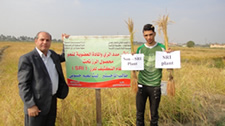 and Water Resources at the college. Hassouni subsequently published an article on portions of his work in the Iraqi Journal of Agricultural Science.
and Water Resources at the college. Hassouni subsequently published an article on portions of his work in the Iraqi Journal of Agricultural Science.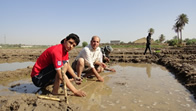 The trials evaluated three different irrigation regimes (continuous submergence, and intermittent irrigation at 3-day intervals and at 5-day intervals) with three amounts of organic manure (0 ton/ha, 5 tons/ha, and 10 tons/ha) for growing two important rice varieties (Anber33 and Jasmine), comparing these treatments’ results with the results of conventional methods of rice cultivation. The thesis showed great benefits from water reduction contributing to a yield increase of 29.5%. The water reduction compared with continuous submergence was 57.6% when irrigation intervals were 3 days and 63.2% when they were 5 days. The amount of water consumed with 3-day intervals was 3.67 mm (equal to 36,762 m³.haˉ¹) and with 5-day intervals, it was 3.18 mm (equal to 31,869 m³.haˉ¹). With continuous submergence, water consumption was 8.66 mm (equal to 86,678 m³.haˉ¹).
The trials evaluated three different irrigation regimes (continuous submergence, and intermittent irrigation at 3-day intervals and at 5-day intervals) with three amounts of organic manure (0 ton/ha, 5 tons/ha, and 10 tons/ha) for growing two important rice varieties (Anber33 and Jasmine), comparing these treatments’ results with the results of conventional methods of rice cultivation. The thesis showed great benefits from water reduction contributing to a yield increase of 29.5%. The water reduction compared with continuous submergence was 57.6% when irrigation intervals were 3 days and 63.2% when they were 5 days. The amount of water consumed with 3-day intervals was 3.67 mm (equal to 36,762 m³.haˉ¹) and with 5-day intervals, it was 3.18 mm (equal to 31,869 m³.haˉ¹). With continuous submergence, water consumption was 8.66 mm (equal to 86,678 m³.haˉ¹). Also, with the intermittent irrigation and SRI crop management (transplanting of young, single seedlings, widely spaced in a square pattern), there were improved soil physical properties, more vigorous root systems, and better plant performance, all with consumption of less water. The thesis committee recommended to the Soil Department that research on SRI be expanded and that this subject be included for students obtaining MSc and PhD degrees in the future. The full thesis is available in Arabic, with an abstract in English for researchers around the world. (See report for details and additional photos that highlight the results.)
2015-2016
 Research at Al-Mishkhab Rice Research Station on the Influence of Irrigation Periods and Organic Manure on SRI-Grown Rice
Research at Al-Mishkhab Rice Research Station on the Influence of Irrigation Periods and Organic Manure on SRI-Grown Rice
[February, 2016]
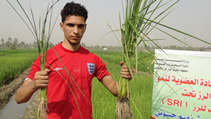 Because of positive results with the SRI system, Iraq's Ministry of Agriculture and Ministry of High Education and Scientific Research have planned to do studies on the SRI system and put it into their approaches to developing the rice sector in Iraq. In the 2015 rice season, Laith Naeem Hassoni (right) began conducting trials on SRI at Al-Mishkhab Rice Research Station for his Master's thesis on the influence of irrigation periods and organic manure on rice growth under System of Rice Intensification (SRI). During the rice-growing cycle, the amount of irrigation water was measured for several irrigation levels (continuous flooding, 3-day intervals, and 5-day intervals), with decomposed organic manure applied to SRI plots at two levels (10 tons/ha, and 5 tons/ha). The results of the SRI plots were were compared with non-SRI management (farmer practices).
Because of positive results with the SRI system, Iraq's Ministry of Agriculture and Ministry of High Education and Scientific Research have planned to do studies on the SRI system and put it into their approaches to developing the rice sector in Iraq. In the 2015 rice season, Laith Naeem Hassoni (right) began conducting trials on SRI at Al-Mishkhab Rice Research Station for his Master's thesis on the influence of irrigation periods and organic manure on rice growth under System of Rice Intensification (SRI). During the rice-growing cycle, the amount of irrigation water was measured for several irrigation levels (continuous flooding, 3-day intervals, and 5-day intervals), with decomposed organic manure applied to SRI plots at two levels (10 tons/ha, and 5 tons/ha). The results of the SRI plots were were compared with non-SRI management (farmer practices). The initial results demonstrated very good results from SRI management for plant growth, water reduction, grain yield, and soil physical characteristics. The reduction over current practice showed substantial savings of precious water. SRI plants grew well (taller tillers, greater length roots, higher net assimilate ratio, etc.). Soil analysis is underway to assess the effects on soil fertility, nutrient levels, etc. (See report for details.)
2005-2014 -see IRAQ ACTIVITY ARCHIVES!
Workshops and Trainings [up to 2011 only]
- A workshop was held at the Ministry of Agriculture on May 10, 2011, to review SRI progress over the past five years and plan for future activities.
- Khidhir Hameed and MRSS colleagues delivered several training courses with lectures in Najaf and Diwaniya Provinces from April 29 to June 7, 2009, that were attended by more than 1,000 rice farmers and agricultural staff.
- A field day was held on October 23, 2008, at the Al-Mishkhab Rice Research Station in Najaf, Iraq. During April and May, 2008, training on SRI methods was provided to 1,600 men and 400 women farmers in Al-Muthanna province. This was supplemented by 12 field demonstrations that were visited by over 1,200 farmers during the season. Training was also given to farmers on producing organic manure from farm materials.
- A field day was held on October 22, 2007, at the Al-Mishkhab Rice Research Station in Najaf, Iraq. In attendance were the Director of Rice Development Department; the General Director of State Board of Agricultural Research; the Head of Najaf Agricultural Committee; and the Director of Najaf Directorate of Agriculture.
- The State Board of Agricultural Extension and Cooperation and MRRS held a five day training course, 9-13 September 2007, at the Agriculture Extension and Training Center in Diwaniya province. Flayeh Abed Jaber, MRRS director, and Khidir made presentations to 28 agricultural staff from 8 provinces (Baghdad, Messan, Babel, Diwaniya, Muthanna, Thi Qar, Basrah, and Najaf).
Reports and General Articles
- Hameed, Khidhir Abbas. 2024. Symposium on the System of Rice Intensification (SRI) in Salymania governorate at northern Iraq’s of Kurdistan Region. SRI-Rice website, Iraq page. August 11.
- 2024. (SRI seminar in Kurdistan). General Directorate of Agriculture in Salymania Facebook post. August 6. [Includes videos of SRI symposium in Salymania governorate, Kurdistan.]
- Hameed, Khidhir Abbas, and Abdulkadhim Jawad Musa. 2021. Report on our activities on the SRI system during the past four rice seasons in Iraq (2018-2021). SRI-Rice website. November.
- Hameed, Khidhir Abbas. 2016. Report on a thesis on the System of Rice Intensification (SRI) in Iraq. SRI-Rice website. [Report of trials by Laith Naeem Hassoni conducted on irrigation and organic inputs effect on SRI at the Al-Mishkhab Rice Research Station in Iraq.] (4p., 3.04MB pdf)
- Hameed, Khidhir. 2009. Report on SRI workshop in Iraq, May 2011. (2 p., 251KB pdf). SRI-Rice website. [Report from Al-Mishkhab Rice Research Station in Najaf, Iraq.]
- Hameed, Khidhir and Flayeh A. Jaber. 2010. SRI at Agriculture Fair at Najaf Province, Iraq. (2 p., 251KB pdf) SRI-Rice website. [Report from Al-Mishkhab Rice Research Station in Najaf, Iraq.]
- Hameed, Khidhir A. and Flayeh A. Jaber. 2009. Implementation of System of Rice Intensification (SRI) at Najaf and Diwaniya Provinces of Iraq – Season 2009. SRI-Rice website. (12 p., 544KB pdf) [Report from Al-Mishkhab Rice Research Station in Najaf, Iraq.]
- Hameed, Khidhir. 2009. Lectures on SRI in Najaf and Diwaniya Provinces. SRI-Rice website. (3p. pdf) [Report from Al-Mishkhab Rice Research Station in Najaf, Iraq.]
- Hameed, Khidhir and Flayeh A. Jaber. 2009. System of Rice Intensification performance in Iraq during 2008. SRI-Rice website. (8p. pdf) [Report from Al-Mishkhab Rice Research Station in Najaf, Iraq.]
- Hameed, Khidhir A., F. A. Jaber, A. Y. Hadi, J .A. H. Elewi, and N. Uphoff. 2009. Influence of System of Rice Intensification (SRI) Methods on Productivity and Yield Components of Jasmine Rice Variety in Al-Muthanna Province, Iraq -- Season 2008. State Board for Agriculture Research/Al-Mishkhab Rice Research Station, Najaf, Iraq. (7p., 70.64 KB pdf)
- Hameed, Khidhir and Flayeh A. Jaber. 2008. Concerns on SRI in Al-Muthanna Province in Iraqi. SRI-Rice website. (2p. pdf) [Report from Al-Mishkhab Rice Research Station in Najaf, Iraq.]
- Hameed, Khidhir and Flayeh A. Jaber. 2008. SRI lectures at Al-Muthanna Province Iraq, 2008. System of Rice Intensification website. (2p. pdf) [Report from Al-Mishkhab Rice Research Station in Najaf, Iraq.]
- Hameed, Khidhir. 2007. System of Rice Intensification in Iraq during 2007.SRI-Rice website. (17p. pdf) [Report from Al-Mishkhab Rice Research Station in Najaf, Iraq.]
- 2007. SRI in Iraq. J-SRI News Letter No. 002. University of Tokyo website. (1p. pdf)
- Hameed, Khidhir. 2007. Experimenting with the System of Rice Intensification in Iraq. ILEIA Magazine, Field Notes section, June.
- Hameed, Khidhir. 2007. Interest of some managers on SRI in Iraq. SRI-Rice website. (2p. pdf) [Report from Al-Mishkhab Rice Research Station in Najaf, Iraq.]
- Summaries of other Arabic language printed
material :
- 2007 articles in two Iraqi newspapers: Tareek Al-Shaab (People’s Way) and Al-Sabaah (The Morning)
- The Iraq Agriculture magazine published by the Ministry of Agriculture to support its agricultural extension efforts, published an article on the concepts of SRI. - Hameed, Khidhir. 2006. Extension of SRI methods in Iraq marshes. SRI-Rice website. (6p. pdf) [Report from Al-Mishkhab Rice Research Station in Najaf, Iraq. Also includes 3 -page section on SRI organic matter trials]
- Hameed, Khidhir Abbas. 2005. Report on System of Rice Intensification Performance in 2005 Season in Iraq. SRI-Ricewebsite. (2p. pdf) [Report from Al-Mishkhab Rice Research Station in Najaf, Iraq.]
Research and Evaluations
- Kery, Amenah Muhammed. 2024. Financial evaluation of intensive farming (SRI) method and forecasting farmers’ adoption of this method: دراسة استطلاعية لعينة من العاملين في بعض الوحدات الاقتصادية المدرجة في سوق العراق للأوراق المالية. 2024. Journal of Accounting and Financial Studies 19(69): 81-102.
- Hameed, Khidhir A., and Abdulkadir J. Musa. 2023. Iraqi stratgey for mitigating the impact of climate change using System of Rice Intensification (SRI). ICDA-2023 Lead/Keynote Proceedings Book, p. 21-27. [Presentation at the 1st International Conference on Decarbonizing Agriculture, Nov. 25-27, 2023, in Mangalore, Karnataka] [accessed December 28, 2023]
- Musa, Abdulkadhim Jawad, Saddam Hussein Abbas, and Khidhir Abbas Hameed. Performance of two rice (Oryza Sativa L.) genotypes under SRI and conventional farming methods in three locations in Iraq. IOP Conference Series: Earth and Environmental Science. 910(1): IOP Publishing, 2021.
- Hameed, K. A., and R. M. Khazraji. 2013. Attitude of rice farmers towards the System of Rice Intensification (SRI) at Al-Muthanna Governorate in Iraq and its relationship with some variables. Qadisiya Journal for Agricultural Sciences3(1): 84-100. [accessed December 28, 2023]
- Hameed, K. A., and R. M. Al-Khzaraji. 2014. Attitude of rice farmers towards rice transplanting according to System of Rice Intensification(SRI) at Al-Muthanna governorate in Iraq and its relationship with some variables. Iraqi Journal for Agricultural Sciences 19(7 special issues}: 187-203. [accessed December 28, 2023]
- Hameed, K. A., and Jaber, F. A. 2015. Effect of seedlings age and its effect on growth and grain yield and components of yield of two rice cultivars. Journal of Karbala University 13(1): 119-131. [accessed December 28, 2023]
- Hameed, K. A. 2015. Different plant density by transplanting square pattern with wide spacing and its influence on yield and components of yield. Qadisiya Journal for Agricultural Sciences 5 (1): 36-43. [accessed December 28, 2023]
- Hassouni, N. L. 2016. Effects of irrigation scheduling and the application of organic matter on rice yield under the System of Rice Intensification (SRI). M.Sc. thesis. Baghdad University. [no link]
- Al-Esawi, Abood Waheed Abood. 2023. Response of Jasmine rice to different levels of irrigation and organic fertilization under SRI cultivation method. Kufa Journal For Agricultural Sciences 15(2): 74-83. doi:10.36077/kjas/2023/v15i2.10351 [accessed December 9, 2023]
- Mohammed, Mohammed Khalid, Khidhir Abbas Hameed, and Abdulkadhim Jawad Musa. 2023. Water savings, yield, and economic benefits of using SRI methods with deficit irrigation in water-scarce southern Iraq. Agronomy 13(6): 1481. doi:10.3390/agronomy13061481
- Hameed, Khidhir Abbas 2022. Study to estimate water savings, yield and income benefits from using SRI methods in Southern Iraq. Journal of Rice Research 15(special issue): 110-111. doi:10.58297/KRHI2562
- Musa, Jawad, Saddam Hussein Abbas, and Khidhir Abbas Hameed. 2021. Performance of two rice (Oryza sativa L.) genotypes Under modern and conventional farming methods in three locations in Iraq. IOP Conf. Series: Earth and Environmental Science 910(1): 012067. doi:10.1088/1755-1315/910/1/012067
- Al-Hasani, L. N. H., A. J. Musa, and S. B. Salem. 2021. Influence of irrigation and tillage patterns on yield and its components for five rice varieties (Oryza sativa L.) under the System of Rice Intensification (SRI). Euphrates Journal of Agriculture Science 13(2): 17-32.
- Al-Hasanie, L. N. H., and A. D. Al-Maadhedi. 2017. Influence of irrigation periods and organic fertilizer on two rice varieties grown under System of Rice Intensification (SRI). The Iraqi Journal of Agricultural Sciences 48(3): 823-840.
- Hameed, Khidhir Abbas. 2017. 2016 thesis on System of Rice Intensification (SRI) is awarded master’s degree for the first time in Iraq. SRI-Rice website. [Summary of a thesis by Laith Hassouni from Baghdad University.] [uploaded January 26,2017]
- Hassouni, Laith Naeem. 2016. Effects of irrigation scheduling and the application of organic matter on rice yield under the System of Rice Intensification (SRI). Master's thesis, Baghdad University (Iraq). (153 p., 4.86MB pdf) [accessed January 23, 2017]
- Hameed, Khidhir Abbas. 2016. Report on a thesis on the System of Rice Intensification (SRI) in Iraq. SRI-Rice website. [Report of trials by Laith Naeem Hassoni conducted on irrigation and organic inputs effect on SRI at the Al-Mishkhab Rice Research Station in Iraq.] (4p., 3.04MB pdf)
- Hameed, Khidhir A., F. A. Jaber, and A. J. Mosa. 2013. Irrigation water use efficiency for rice production in southern Iraq under System of Rice Intensification management. Taiwan Water Conservancy Journal 61(4): 86-93.
- Hameed, Khidhir A. 2013. Attitude of rice farmers toward of the System of Rice Intensification (SRI) at Al-Muthanna Governorate in Iraq as related to some variables. SRI-Rice website. [This article is adapted from the original which appeared in the Al Qadisiary Journal Al Qadisiay Journal for Agriculture Sciences 1(3): (4p)]
- Hameed, K. A., F. A. Jaber, A. Y. Hadi, J. A. Elewi, and N. Uphoff. 2011. Application of System of Rice Intensification (SRI) methods on productivity of Jasmine rice variety in southern Iraq. Jordan Journal of Agricultural Sciences 7(3):474-481 (not online - for copies, write to K. A. Hameed).
- Hameed, Khidhir Abbas, Abdul-Kadhim Jawad Mosa and Flayeh Abed Jaber. 2011. Irrigation water reduction using System of Rice Intensification compared with conventional cultivation methods in Iraq. Paddy and Water Environment 9:121-127. DOI:10.1007/s10333-010-0243-1
- El-Hakim, Abdul Hussein. 2009. Evaluation report for SRI Program implemented by CHF in Governorate of Muthanna 2008. System of Rice Intensification website. January. [Report from Al-Mishkhab Rice Research Station in Najaf, Iraq.]
- Hameed, Khidhir and Flayeh A. Jaber. 2009. System of Rice Intensification performance in Iraq during 2008. System of Rice Intensification website. (8p. pdf) [Report from Al-Mishkhab Rice Research Station in Najaf, Iraq.]
- Hameed, Khidhir A., F. A. Jaber, A. Y. Hadi, J .A. H. Elewi, and N. Uphoff. 2009. Influence of System of Rice Intensification (SRI) Methods on Productivity and Yield Components of Jasmine Rice Variety in Al-Muthanna Province, Iraq -- Season 2008.
- Hameed, Khidhir. 2007. System of Rice Intensification in Iraq during 2007. System of Rice Intensification website. (17p. pdf) [Report for State Board for Agriculture from Al-Mishkhab Rice Research Station in Najaf, Iraq.]
- Hameed, Khidhir. 2007. Experimenting with the System of Rice Intensification in Iraq. ILEIA Magazine, Field Notes section, June.
Manuals
- Hameed, Khidhir Abbas. 2010. SRI ﻧﻈﺎم اﻟﺘﻜﺜﯿﻒ ﻟﻤﺤﺼﻮل اﻟﺮز SRI field manual for Iraq (Arabic language). SRI-Rice website. [accessed June 17, 2019]
Videos
- 2023 (February 26). Initiative of SRI in Iraq. 4:44 min. SRI-Rice channel, YouTube. [A video on implementation of the System of Rice Intensification in Iraq by Khidhir Abbas Hameed and staff of the Al-Mishkhab Rice Research Station in Najaf, Iraq. Farmer testimonies are included.]
- 2018 (November 6). حلقة جديدةمن البرنامج الزراعي غذاؤنا من ارضنا. 18:17 min. قناه الارشاد الزراعي في العرا channel, YouTube. [Video from a TV news show called "Our Food from our Land". The first 7 minutes of this 18 minute news clip are about rice production, in which Khidhir Abbas Hameed explains about SRI principles of organic inputs, wider spacing, and reduced water use with AWD. The Agriculture Extension and Training Center in Najaf convened the rice farmers using Farmer Field School methods.]
- 2015 (March 15). SRI - System of Rice Intensification in Iraq. 21:32 min. Produced by Al-Mishkab Rice Research Station in Najaf, Iraq. 21:32 min. SRI-Rice channel, YouTube. [SRI success and constraints in Iraq based on 2008 experiences promoting SRI in Al-Muthanna Province, Iraq. Farmer interviews are included.]
- Hameed, Khidir A., and Flaih A. Jaber. 2010 (March 22). The System of Rice
Intensification (SRI) in Iraq. Arabic language video published on the
SRI-Cornell channel on YouTube (in three parts).
Part 1: 8:56 min. Part 2 9:44 min. Part 3 2:57 min.
Also available as a single video, SRI in Iraq, from Farmer-Centered Research and Development Program at Cornell University [Video about SRI in the Iraqi context by researchers at the Al-Mishkab Rice Research Station in Najaf, Iraq. Most Iraqi footage is from Al-Muthanna Province.] - Jaber, Flaih A. and Khidir A. Hameed. 2009. Paddy Mechanization. A video from Al-Mishkab Rice Research Station (MRRS), Najaf, Iraq. 3:09 Min. (Describes land preparation, seed selection, nursery development, and planting with the use of a mechanized transplanter at MRRS in Najaf, Iraq). [see also associated PowerPoint photo set]
- Dr. Khidir Hameed has provided the following downloadable Arabic language TV
program clips about his SRI work and related rice projects in Iraq (2007):
- Al Ghadeer TV clip
(23.8 MB) in the province of Najaf
- Al Diyar TV in Baghdad (2.84
MB)
- Salah Al-Deen, in Baghdad (18.0 MB).
- Al Ghadeer TV clip
(23.8 MB) in the province of Najaf
Presentations
- Hameed, Khidhir Abbas. 2022. Estimated Water Savings, Yield, and Income Benefits from Using SRI Methods from Using SRI in Iraq Presentation at the International Conference on System of Crop Intensification for Climate-Smart Livelihood and Nutritional Security, Hderabad, India, December 12-14, 2022. [uploaded December 28, 2022]
- Hameed, Khidhir Abbas. 2020. System of Rice Intensification SRI (Iraq). 39 slides. December 9, 2020. Webinar by the Central and West Asian Rice Center (CWA RIce).
- Hameed, Khidhir Abbas. 2018. Iraq - Initiatives to Spread the SRI in the Middle East and Central Asia. 20 slides. Presentations at the The Workshop to Enhance Cooperation and Sharing among SRI National Networks in Asia, held October 18-19, 2018, at the Leverage Business Hotel-Skudai, Malaysia
- Hameed, Khidhir Abbas. 2018. Rice Water Management and Reduction in Iraq. 19 slides. Presentation at the SRI Research Side event at the 5th International Rice Congress, Sands Expo Convention Centre, Singapore. October 16, 2018.
- Hameed, Khidhir Abbas. 2018. Iraq: Initiative of the System of Rice Intensification. 20 slides. Poster presentation at the Second International Symposium on Agroecology, held April 3-5, 2018, at FAO, Rome.
- Hameed, Khidir Abas. 2014. Iraq's Strategy for Innovative Rice Irrigation and Water Management in Iraq. Presented at the Iraq’s Integrated Drought Risk Management Framework: The Validation Workshop, Amman, Jordan, March 2-5, 2014. 11 slides.
Photo Collection
- Hameed, Khidir A. 2010. Photos of the Paddy Mechanization- Iraq. PowerPoint presentation (on slideshare.net) photos of paddy mechanization carried out at the Al-Mishkab Rice Research Station in Najaf, Iraq. 11 slides.
- Hameed, Khidir A. 2010. Photos of the System of Rice Intensification - Iraq. PowerPoint presentation (on slideshare.net) with photos about the development of SRI in Iraq, primarily in Al-Muthanna, Najaf and Diwaniya Provinces, between 2005 and 2010. 30 slides.
- Hameed, Khidir A. 2008. Six photo sets on SRI in Iraq
- CIIFAD SRI Iraq Photo Collection (see slide show in overview section above or click here to see
individual photos).


